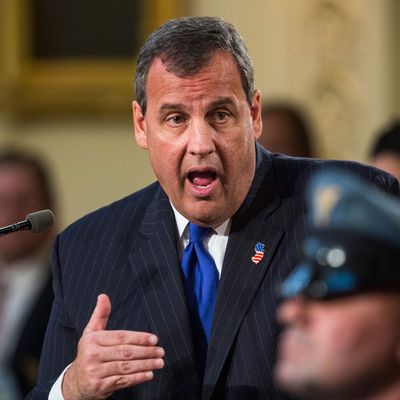
In an interview conducted during his final days as governor of New Jersey, Chris Christie made a very dubious claim about the 2016 presidential nominating contest:
Christie said he has no doubt he would have won if not for the blunt-talking Trump’s decision to run.
“It’s incredibly frustrating to think to yourself, ‘Wow, if this guy were not in the race, we’d win this thing,’” Christie said, reflecting on some internal polling from the campaign. “And I absolutely believe if Trump had not gotten into the race I think we would have won.”
Well, whatever; it’s a counterfactual that can never been conclusively proven or disproven either way. But Christie made another claim, one about New Jersey voters, that is subject to verification: “They’re gonna miss me when I’m gone.”
Not right away, it would appear. A “final grade” public-opinion survey from the Rutgers Center for Public Interest Polling showed only 5 percent of New Jersey adults say they will miss their combative two-term governor. His final job approval ratio was an abysmal 19/74 (not dismissible as a function of partisanship, since it was 20/71 among self-identified independents). Asked to give Christie a letter grade in various policy areas, 72 percent gave him a C or worse on education and schools, as did 77 percent on jobs and the economy; 71 percent on crime and drugs; 71 percent on transportation and infrastructure; 75 percent on the state-pension-fund situation; 82 percent on the state budget; and 85 percent on taxes. That’s a well-rounded bad report card.
Every unpopular politician, of course, thinks she or he is suffering for brave acts that will look better as time passes by. Christie is no exception. But he also thinks his failed presidential campaign kept him from remaining popular at home:
“You could decide not to run for president because you want to sit around and protect these (poll) numbers that you guys talk about all the time,” he said. “When a risk doesn’t work, people perceive it as a failure, right? If I had won (the race) for president, we wouldn’t have to worry about this.”
He’s entitled to his opinion, of course, but Christie’s New Jersey approval ratio went underwater at the beginning of 2014 and steadily sank thereafter. His unpopularity at home was a lodestone in his presidential campaign, not a victim of that presidential campaign’s failure.
And once national Republicans got a good look at Christie, they disliked him, too, as this assessment from May 2015 illustrated:
Christie stands out in every poll over Republican proto-candidates in almost any state where there’s polling as someone GOP voters have considered and rejected. His favorable/unfavorable ratio in the most recent national poll of Republicans was at 31/52 (PPP, May 13). In an April poll for NBC asking if Republicans could envision themselves ever supporting various candidates, fully 50 percent said “no” to any support for Christie, far more than for any other name. In the latest Iowa survey (from Quinnipiac) he’s running eighth at 3 percent, despite very high name ID, and has a favorable/unfavorable ratio of 32/56.
Chris Christie really shouldn’t pretend his unpopularity is temporary. He worked hard to earn it, and it may be his most enduring legacy.






























